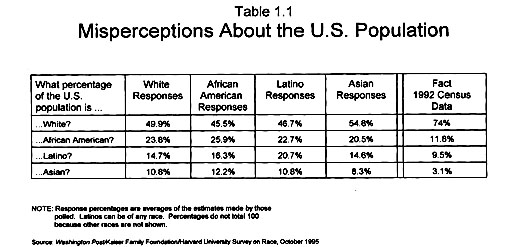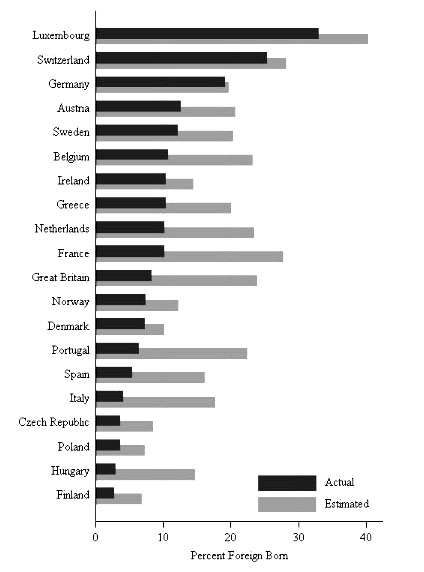Misperception of minorities and immigrants: Difference between revisions
No edit summary |
No edit summary |
||
| (15 intermediate revisions by 2 users not shown) | |||
| Line 1: | Line 1: | ||
http://www.stat.columbia.edu/~cook/movabletype/mlm/ Statistical Modeling, Causal Inference, and Social Science] is | [http://www.stat.columbia.edu/~cook/movabletype/mlm/ Statistical Modeling, Causal Inference, and Social Science] is a statistics Blog. It is maintained by [http://www.stat.columbia.edu/~gelman/ Andrew Gelman], a statistician in the Departments of Statistics and Political Science at Columbia University. | ||
You will find lots of interesting statistics discussion here. Andrew also gave a [http://www.superdickery.com/stupor/2.html link] to a cartoon in which Superman shows how he would estimate the number of beans in a jar. This also qualifies as a forsooth item. | |||
<blockquote> -Average percentage of UK population that Britons believe to be immigrants: 21<br> | In a July 1, 2005 posting Andrew continues an earlier discussion on [http://www.stat.columbia.edu/~cook/movabletype/archives/2005/06/misperception_o.html misperception of minorities]. This earlier discussion resulted from by a note from Tyler Cowen reporting that the March [http://www.harpers.org/HarpersIndex.html Harper's Index] includes the statement: | ||
<blockquote> -Average percentage of UK population that Britons believe to be immigrants: 21%<br> | |||
-Actual percentage: 8%</blockquote> | -Actual percentage: 8%</blockquote> | ||
Harpers gives as reference the Market & Opinion | Harpers gives as reference the Market & Opinion Research International (MORI). We could not find this statistic on the MORI website but we found something close to it in a Readers Digest (UK) report (November 2000) of a [http://www.mori.com/polls/2000/rd-july.shtml study] "Britain Today - Are We An Intolerant Nation?" that MORI did for the Readers Digest (UK) in 2000. The Digest reports: | ||
*A massive eight in ten (80%) of British adults believe that refugees come to this country because they regard Britain as 'a soft touch'. | *A massive eight in ten (80%) of British adults believe that refugees come to this country because they regard Britain as 'a soft touch'. | ||
| Line 14: | Line 16: | ||
* Nearly four in ten (37%) feel that those settling in this country 'should not maintain the culture and lifestyle they had at home'. | * Nearly four in ten (37%) feel that those settling in this country 'should not maintain the culture and lifestyle they had at home'. | ||
The Digest goes on to say: | |||
The Digest | |||
* Respondents grossly overestimated the financial aid asylum seekers receive, believing on average that an asylum seeker gets £113 a week to live on. In fact, a single adult seeking asylum gets £36.54 a week in vouchers to be spent at designated stores. Just £10 may be converted to cash. | * Respondents grossly overestimated the financial aid asylum seekers receive, believing on average that an asylum seeker gets £113 a week to live on. In fact, a single adult seeking asylum gets £36.54 a week in vouchers to be spent at designated stores. Just £10 may be converted to cash. | ||
| Line 23: | Line 22: | ||
* Similarly, they believe that on average 26 per cent of the population belong to an ethnic minority. The real figure is around 7 per cent. | * Similarly, they believe that on average 26 per cent of the population belong to an ethnic minority. The real figure is around 7 per cent. | ||
This is pretty close to the Harper's Index and | This last statistic is pretty close to the Harper's Index and the other responses give us some idea why they might over-estimate the percentage of immigrants. | ||
In the earlier posting, the Harper's Index comments reminded Andrew of an [http://www.washingtonpost.com/ac2/wp-dyn?pagename=article&node=&contentId=A42062-2001Jul10 article] in the Washington Post by Richard Morin (October 8, 1995) in which Morin discussed the results of a Post/Keiser/Harvard [http://www.kff.org/kaiserpolls/1105-index.cfm survey] "Four Americas: Government and Social Policy Through the Eyes of America's Multi-racial and Multi-ethnic Society" | |||
The Keiser report includes the following data: | The Keiser report includes the following data: | ||
<center>[[Image:Keiser2.jpg]]</center> | <center>[[Image:Keiser2.jpg]]</center> | ||
Note that, while it is true that the White population significantly underestimated the number of African Americans, Latinos, and Asians, the same is true for each of these groups. | |||
[http://www.gwu.edu/%7Epsc/people/bio.cfm?name=sides John Sides] sent Andrew the following data on the estimated, and actual percentage of foreign-born residents in each of 20 European countries from the [http:www.europeansocialsurvey.org/ the multi-nation European Social Survey ] : | |||
<center>[[Image:ForeignBorn.jpg]]</center> | |||
We see that we have signficant overestimation of the number of foreign-born residents, but Germany almost got it right. You will find further discussion on this topic by Andrew and John on the July1, 2005 posting on [http://www.stat.columbia.edu/~gelman/blog/ Andrew's blog]. | |||
DISCUSSION QUESTION: | |||
(1) What explanations can you think of that might explain this overestimation? Can you suggest additional research that might clarify what is going on here? | |||
Latest revision as of 15:51, 6 August 2005
Statistical Modeling, Causal Inference, and Social Science is a statistics Blog. It is maintained by Andrew Gelman, a statistician in the Departments of Statistics and Political Science at Columbia University.
You will find lots of interesting statistics discussion here. Andrew also gave a link to a cartoon in which Superman shows how he would estimate the number of beans in a jar. This also qualifies as a forsooth item.
In a July 1, 2005 posting Andrew continues an earlier discussion on misperception of minorities. This earlier discussion resulted from by a note from Tyler Cowen reporting that the March Harper's Index includes the statement:
-Average percentage of UK population that Britons believe to be immigrants: 21%
-Actual percentage: 8%
Harpers gives as reference the Market & Opinion Research International (MORI). We could not find this statistic on the MORI website but we found something close to it in a Readers Digest (UK) report (November 2000) of a study "Britain Today - Are We An Intolerant Nation?" that MORI did for the Readers Digest (UK) in 2000. The Digest reports:
- A massive eight in ten (80%) of British adults believe that refugees come to this country because they regard Britain as 'a soft touch'.
- Two thirds (66%) think that 'there are too many immigrants in Britain'.
- Almost two thirds (63%) feel that 'too much is done to help immigrants'.
- Nearly four in ten (37%) feel that those settling in this country 'should not maintain the culture and lifestyle they had at home'.
The Digest goes on to say:
- Respondents grossly overestimated the financial aid asylum seekers receive, believing on average that an asylum seeker gets £113 a week to live on. In fact, a single adult seeking asylum gets £36.54 a week in vouchers to be spent at designated stores. Just £10 may be converted to cash.
- On average the public estimates that 20 per cent of the British population are immigrants. The real figure is around 4 per cent.
- Similarly, they believe that on average 26 per cent of the population belong to an ethnic minority. The real figure is around 7 per cent.
This last statistic is pretty close to the Harper's Index and the other responses give us some idea why they might over-estimate the percentage of immigrants.
In the earlier posting, the Harper's Index comments reminded Andrew of an article in the Washington Post by Richard Morin (October 8, 1995) in which Morin discussed the results of a Post/Keiser/Harvard survey "Four Americas: Government and Social Policy Through the Eyes of America's Multi-racial and Multi-ethnic Society"
The Keiser report includes the following data:

Note that, while it is true that the White population significantly underestimated the number of African Americans, Latinos, and Asians, the same is true for each of these groups.
John Sides sent Andrew the following data on the estimated, and actual percentage of foreign-born residents in each of 20 European countries from the [http:www.europeansocialsurvey.org/ the multi-nation European Social Survey ] :

We see that we have signficant overestimation of the number of foreign-born residents, but Germany almost got it right. You will find further discussion on this topic by Andrew and John on the July1, 2005 posting on Andrew's blog.
DISCUSSION QUESTION:
(1) What explanations can you think of that might explain this overestimation? Can you suggest additional research that might clarify what is going on here?